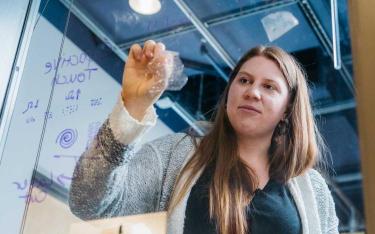Fiona Bell: Intimacy between designers and materials leads to sustainability

Designers who feel disconnected from the materials they work with are more likely to send those materials to the landfill after the material’s usefulness has passed, says ATLAS PhD student Fiona Bell.
Bell, a member of the Living Matter Lab, directed by Assistant Professor Mirela Alistar, is passionate about sustainability; her doctoral dissertation tackles how to reduce waste through encouraging intimate relationships between designers, the materials they use and the artifacts they develop. In recognition of her work, Bell recently received financial support to help complete her thesis through a Graduate School Dissertation Completion Fellowship.
“Materials and artifacts that the designer feels more deeply connected to are less likely to be thrown away or taken for granted ," Bell says. "Instead they are refurbished, recycled, or composted once no longer needed."
Her research, “Intimate Design,” is a new framework for human-computer interaction (HCI) designers which expresses Bell’s way of thinking, making and approaching design projects; it stems from Bell’s own experiences developing and designing with biomaterials.
“An intimate relationship benefits both entities,” Bell says. “ By working with the material (learning its limitations and realizing its unique characteristic) to arrive at a design rather than forcing a material to fit an envisioned design, the designer forms a mutually beneficial relationship with the material, where the resulting artifact reflects both the designer's vision and the material’s capabilities. Ultimately, I hope that Intimate Design inspires designers to deeply connect with their materials and build more personally meaningful artifacts by radically shifting current HCI perspectives.”
Some examples of that shift come from Bell’s research, including using stains as time markers [1], cooking biodegradable fashion items [2] and re-clayming food waste [3].
Bell has been recognized multiple times for her achievements. In 2021, she received a Beverly Sears Graduate Student Grant. She also took home a top award from the 15th ACM International Conference on Tangible Embedded and Embodied Interaction (TEI) Student Design Challenge for her Undyeing Swatch project. And she completed a prestigious internship with Accenture Labs, assisting with the development of self-cleaning textiles.
She adds that hand-making rather than machine fabrication builds intimacy in the design process. The designer gains awareness about the resources needed to fabricate the artifact and what happens to an artifact after it is no longer needed or wanted.
“The gained responsibility and awareness then leads to deeper relationships between the designer and their artifacts, fostering more sustainable and intimate design practices,” she says.
Associated Publications
[1] Fiona Bell, Alice Hong, Andreea Danielescu, Aditi Maheshwari, Ben Greenspan, Hiroshi Ishii, Laura Devendorf, and Mirela Alistar. 2021. Self-deStaining Textiles: Designing Interactive Systems with Fabric, Stains and Light. In Proceedings of the 2021 CHI Conference on Human Factors in Computing Systems (CHI ’21). Association for Computing Machinery, New York, NY, USA, 1–12. (Yokohama, Japan (virtual)–May 8-13, 2021). pdf.
[2] Fiona Bell, Latifa Al-Naimi, Ella McQuaid, and Mirela Alistar. 2022. Designing with Alganyl. In Sixteenth International Conference on Tangible, Embedded, and Embodied Interaction (TEI '22). Association for Computing Machinery, New York, NY, USA, Article 2, 1-14. DOI: https://doi.org/10.1145/3490149.3501308 (Daejeon, Republic of Korea (virtual) Feb. 13-16, 2022).
[3] Fiona Bell, Netta Ofer, and Mirela Alistar. 2022. ReClaym our Compost: Biodegradable Clay for Intimate Making. In Proceedings of the 2022 CHI Conference on Human Factors in Computing Systems (CHI ’22). Association for Computing Machinery, New York, NY, USA, 1–14. DOI: https://doi.org/10.1145/3491102.3517711 (New Orleans, LA, USA—April 29-May 5, 2022).


